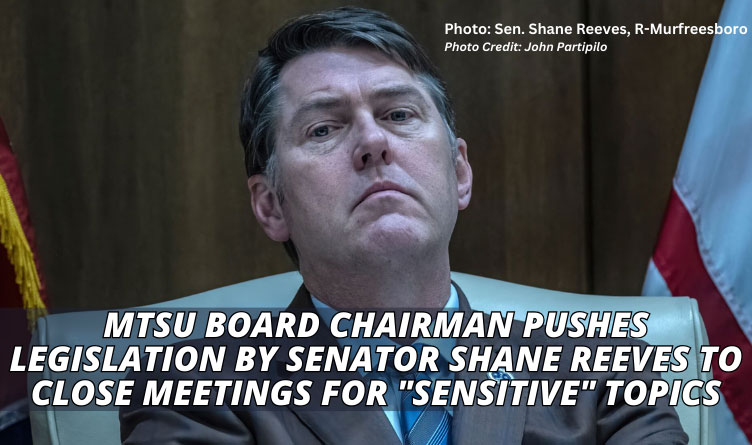Photo: Sen. Shane Reeves, R-Murfreesboro, is sponsoring a bill that would close public college board meetings to discuss “sensitive” topics. Photo Credit: John Partipilo
By Sam Stockard [Tennessee Lookout -CC BY-NC-ND 4.0] –
Middle Tennessee State University’s board chair is pushing legislation, sponsored by State Sen. Shane Reeves and Rep. Mark White, that would enable college boards to close meetings to discuss “sensitive” matters such as presidential pay, a move critics say is too “broad” and ripe for “abuse.”
Bill Ketron, a former state senator who lobbies the Legislature for MTSU, confirmed to the Tennessee Lookout that university board Chairman Stephen Smith requested the bill be introduced and spoke with MTSU President Sidney McPhee about the measure.
Sponsors are House Education Administration Chairman Mark White, R-East Memphis, and Sen. Shane Reeves, R-Murfreesboro.

“Basically, they could go into executive session to take up, for example, Dr. McPhee’s salary,” Ketron said.
The MTSU board, which was created in 2016, has not made the initiative part of its legislative agenda for the year. McPhee referred questions on the matter to Smith, who is the driving force behind the bill, according to MTSU spokesman Jimmy Hart. Smith declined to answer email questions through Hart.
University boards can go into executive session to discuss certain items such as pending lawsuits, but they can’t deliberate privately toward a decision.
The House Higher Education Subcommittee passed the measure last Monday but is set to vote on it again today (March 18) because the bill used as the vehicle changed from HB2561 to HB2324.
White did not identify MTSU as seeking the legislation when he brought it before the subcommittee last week but explained that if a state university board needs to discuss “sensitive topics,” it could conduct an executive session that isn’t subject to open meeting requirements under state law.
If a board intends to hold an executive session, it would have to provide “reasonable notice” to the public and can’t work toward a decision on anything other than the “sensitive” issue, according to White.
“We all know there are topics … that come up that they have to discuss that really don’t need to be out in the public or the press if they’re talking about maybe appointing a new president or there may be a lawsuit,” White told the subcommittee.

In fact, no exemption is made in state law for discussing personnel matters during board meetings, but if matters involve termination or a change in someone’s contract that could involve litigation, boards could use that as a method to handle matters under attorney-client privilege.
White acknowledged the board might not have to discuss their executive session topic afterward in a public meeting, pointing out boards might not be ready to say which way they’re leaning in a presidential search, a process that could take months, or even a legal matter.
Rep. Harold Love, D-Nashville, said he felt the board should make a recording or written minutes of their deliberations public at some point.
Likewise, Rep. Ed Butler, R-Rickman, questioned whether the policy could “be abused,” asking whether someone could request a copy of the minutes or a recording of the executive session.
“Could we not … utilize this piece of legislation specifically for a couple of items instead of leaving it so broad?” Butler asked, for instance hiring a new president and discussing salaries. “I don’t know that there’s any other incidence that the public wouldn’t have a right to know what’s going on.”
White responded that he would have to “get clarity” on Butler’s point.

The subcommittee’s attorney said “sensitive topics” include items not open to public inspection and other matters deemed confidential or privileged by law, in addition to pending litigation and legal controversies, audits, items protected by federal law and matters involving suspected illegal, wasteful or fraudulent activity at the state university for which an informant requested anonymity from the university board.
The Tennessee Coalition for Open Government opposes the bill, saying it includes no requirement for boards to reveal what they’ll discuss privately and allows them to have full deliberations in a closed session, enabling them to reach a decision privately and hold “ceremonious” votes in public.
“There is too much room in this bill for abuse,” Deborah Fisher, executive director of the coalition, said in a statement. “The bill’s definition of ‘sensitive issues’ also needs to be tightened up and defined better so that it is not so broad and not so open for abuse.”
Fisher contends the bill runs counter to the language of the Open Meetings Act, which “declares it to be the policy of this state that the formation of public policy and decisions is public business and shall not be conducted in secret.”


About the Author: Sam Stockard is a veteran Tennessee reporter and editor, having written for the Daily News Journal in Murfreesboro, where he served as lead editor when the paper won an award for being the state’s best Sunday newspaper two years in a row. He has led the Capitol Hill bureau for The Daily Memphian. His awards include Best Single Editorial from the Tennessee Press Association. Follow Stockard on Twitter @StockardSam



2 Responses
Anything “of God” is open and above board.
Please keep us apprised of committee assignment, etc.
In other words, anytime you want to discuss something you think might not meet with public acceptance, close the meeting and do you deeds in darkness.